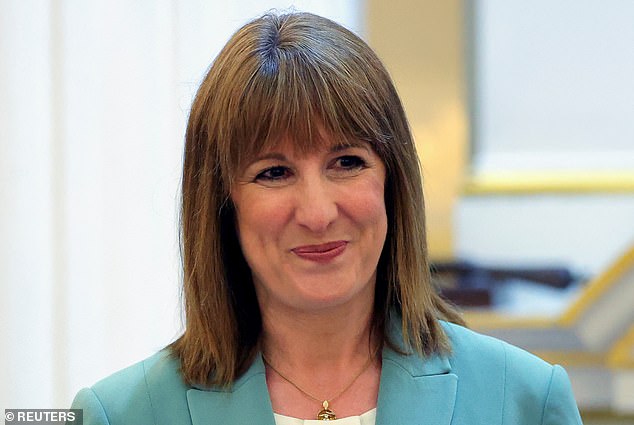[ad_1]
What planet is Rachel Reeves on?
Just hours after the Chancellor assured her City audience at the Mansion House dinner that Labour is building a ‘Britain that is better off’, up pop inflation numbers showing that the country is markedly less well off than a year ago.
As the latest figures from the Office of National Statistics show, the UK’s inflation rate ticked up to 3.6 per cent in the year to June – nearly double the target rate – and up from 3.4 per cent in May. It’s the steepest rise since January last year.
Reeves can’t have been doing much of her own food shopping recently, or had to handle household bills for her two homes.
Otherwise she would have seen for herself that even the most basic of foods like butter and milk have been shooting up, as have energy costs, water bills and rents.
As any regular shopper could have told her weeks ago, food prices have been creeping up again for some time.

Delusions: Chancellor Rachel Reeves assured her City audience at the Mansion House dinner that Labour is building a ‘Britain that is better off’
In June, they were 4.4 per cent higher, the third month in a row that prices have risen and the frothiest increase for 18 months.
But the biggest driver behind the June price hikes compared to a year ago are rising housing costs – despite interest rate cuts – including rents which are up by 5.8 per cent.
Energy costs were up by 6.8 per cent despite an overall fall in fuel prices while water bills shot up by a staggering 26 per cent.
And the reason for inflation running hot again? This time energy and raw material costs can’t be blamed solely on Russia’s invasion of Ukraine, Donald Trump’s tariffs or even the Middle East.
This time businesses are being more honest – they are passing on higher costs to their customers because of the recent increase in employers’ National Insurance (NI) and other tax rises. It’s a home-grown problem. An own goal, if you like.
In which case, you have to ask whether the Chancellor is either delusional or blind when making other equally extraordinary claims during her speech.
Labour, she said, had ‘restored Britain’s reputation as a beacon of stability by putting the public finances back on a stable footing’.
Really? Reeves is pulling our leg. Gilt yields are high, growth is risible if not grinding to a halt, demand is down, the welfare state continues to balloon and the public finances are in dire straits.
Figures out today are likely to show a further shake-out in the jobs market triggered by the NI increases, confirming recent warnings by Andrew Bailey, the Bank of England Governor, that the jobs tax is leading to greater unemployment.
That is why, despite the latest figures, interest rates are likely to be trimmed in August. When will the Chancellor learn that you can’t deliver growth by parroting that you want it? Human endeavour doesn’t work like that.
If you want entrepreneurs and companies to risk their capital, they must feel confident about a brighter future – and potential rewards – rather than booking flights to Dubai.
That’s why her much-mooted Big Bang-style Leeds Reforms, aimed at making the ‘country more active and more confident’, are such a damp squib. Her ambition is the right one, but badly executed.
More worryingly, these reforms may lead to another wave of dangerous light-touch regulation – just like we saw under the last Labour administration.
She’s right that the London Stock Exchange needs to be made more attractive for listings and that households should be encouraged to invest in equities. UK adults own the smallest amount of their wealth in investments of any G7 country at 8 per cent.
But you can’t order companies to list in London if they can get better valuations across the Atlantic. And you can’t order savers to put their money into equities or invest in unquoted companies, however much Sid might tell you to, and certainly not order them to invest more in UK companies, without incentives.
So it’s not surprising that most City figures are decidedly underwhelmed by her Leeds Reforms, while the rest of us are simply bemused.
It would have been much cleverer if Reeves had looked to Sweden where households invest 50 per cent of their assets in equities and investment funds, up from a third just two decades ago.
And how was this achieved? First, the government abolished stamp duty on equities, then introduced investment savings accounts which attracted a small flat tax. No capital gains or dividend tax.
Big, bold and simple. That’s what we should do here instead of the usual fiddling around.
DIY INVESTING PLATFORMS

AJ Bell

AJ Bell
Easy investing and ready-made portfolios

Hargreaves Lansdown

Hargreaves Lansdown
Free fund dealing and investment ideas

interactive investor

interactive investor
Flat-fee investing from £4.99 per month

InvestEngine

InvestEngine
Account and trading fee-free ETF investing
Trading 212
Trading 212
Free share dealing and no account fee
Affiliate links: If you take out a product This is Money may earn a commission. These deals are chosen by our editorial team, as we think they are worth highlighting. This does not affect our editorial independence.
[ad_2]
This article was originally published by a www.dailymail.co.uk . Read the Original article here. .

